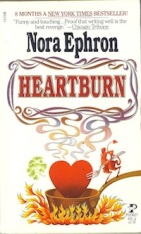
Friendships with authors should carry a warning: anything you say or do risks ending up in print and should be shared with caution. I m entioned in my last blog post that my early magazine stories were often inspired by my personal romantic disasters. Changing humiliation to triumph and inventing nasty fictional misfortunes on London lotharios who dumped me was hugely satisfying to my wounded pride, much like Nora Ephron who got revenge on her unfaithful husband, Carl Bernstein, with her bestselling novel Heartburn. But when your nearest and dearest start prefacing conversations with ‘If I tell you this, promise you won’t use it in a story’, even a fledgling writer has to learn discretion.
entioned in my last blog post that my early magazine stories were often inspired by my personal romantic disasters. Changing humiliation to triumph and inventing nasty fictional misfortunes on London lotharios who dumped me was hugely satisfying to my wounded pride, much like Nora Ephron who got revenge on her unfaithful husband, Carl Bernstein, with her bestselling novel Heartburn. But when your nearest and dearest start prefacing conversations with ‘If I tell you this, promise you won’t use it in a story’, even a fledgling writer has to learn discretion.
Writers turn to real events all the time for inspiration. Stuff happens to people that your imagination couldn’t make up even if you squeezed it through a juice press. Alice Sebold used a young girl’s murder as inspiration for The Lovely Bones  and Agatha Christie based Murder On The Orient Express on the kidnapping and killing of Charles Lindbergh’s infant son. It’s said that in Hollywood if any tragedy happens, literary agents, like vultures, arrive hot on the heels of the ambulance, hoping to buy the movie rights.
and Agatha Christie based Murder On The Orient Express on the kidnapping and killing of Charles Lindbergh’s infant son. It’s said that in Hollywood if any tragedy happens, literary agents, like vultures, arrive hot on the heels of the ambulance, hoping to buy the movie rights.
For that very reason, as a writer, friendships can be perilous. You’re writing a book about a woman suffering a miscarriage and  suddenly the same thing happens to your best friend. Even as she’s sobbing out details that mirror the events you’ve so painstakingly penned, your evil self wants to take notes while your empathetic side agonizes that you need to ditch the whole project. Who wants to end up like the protagonist in Thomas Wolf’s novel You Can’t Go Home Again where friends and family of a successful author run him out of his hometown, bitter at the betrayal of their sins and indiscretions?
suddenly the same thing happens to your best friend. Even as she’s sobbing out details that mirror the events you’ve so painstakingly penned, your evil self wants to take notes while your empathetic side agonizes that you need to ditch the whole project. Who wants to end up like the protagonist in Thomas Wolf’s novel You Can’t Go Home Again where friends and family of a successful author run him out of his hometown, bitter at the betrayal of their sins and indiscretions?
So where do you, as a writer, draw the line? Is it out of order to use a friend’s (or friend of a friend of a friend’s) tragedy, triumphs or outrageous personality in your fiction? Is it OK or merely callous if you ask permission first? Do you run rampant with the juicy facts or disguise that shocking saga so cannily that even Sherlock Holmes wouldn’t recognize the crime? With our first novel, How To Survive Your Sisters we were absolutely sure the four sisters couldn’t be traced to any particular person in our family. And yet one of our siblings was slightly huffy, claiming she recognized her faults in each of the protagonists
Besides, what if something truly extraordinary happened to someone you knew – newspaper fodder that someone else is bound to pick up (as opposed to all those boring strangers at parties who insist their biography should be your next masterpiece)? Like being the hostage of a crazy gunman? Or behind the wheel of a car that plunges into an icy river?
I mean, really. Obviously friendships are paramount and good taste precludes you from brandishing a contract and asking for an option as she’s still shivering under her blankets, clutching a large brandy. But given a month or two to get over the shock – once she’s warmed up a little – wouldn’t you be denying your art if you simply passed it by?
Just curious. It’s an issue all authors face. How do you deal with it?

Sorry to be late to come in on this – I’m on holiday! Wifi is not always available.
Someone (can’t remember who) once said writers have a splinter of ice in their hearts which makes them view everything that happens in life as potentially usable material. I suspect there’s a lot of truth in that. Even when we are consoling someone, we are squirreling away details for future use.
LikeLiked by 1 person
Of course other people’s misfortunes inspire us! And sometimes, stories can seem like a kind of zeitgeist, and it’s great if we can latch on to it. Take Emma Donoghue’s ROOM, for example. I guess any storyline that’s very specific is difficult – you’d have to discuss it, I suppose – but something more general like a miscarriage … well, they are very common, aren’t they? As for people seeing themselves in your characters, apparently t’s far more common for them NOT to recognise themselves, but to latch on to the likeable characters and associate with them. Let’s hope so, anyway, eh? [winks…]
LikeLiked by 2 people
Room is a great example. Thanks Jenny 🙂
LikeLike
Sometimes, is it possible to place events like these into an historical past (or a sci-fi future) perhaps? Even then, someone will surely find some parallels if they go looking! I think we might mostly like to be discreet, but it’s just very hard to avoid completely.
Thoughtful post!
LikeLiked by 2 people
Twice? By electronic devilment it was a detirmined reply 😇 A truly thought stretching post.
LikeLiked by 1 person
Tastefully, with space between the receiving of knowledge and writing. Name changing and gender altering where possible. Mostly deny deny deny… occasionally, leave to rest peacefully until the twelfth of never. Stronger or the more callously minded of us will use a pen name.😨😱
LikeLiked by 1 person
Great thought-provoking post.
LikeLiked by 1 person
Reblogged this on Chicklit Sisters.
LikeLiked by 1 person
Thanks for your input Jenni. Yes it’s a tricky one especially if you’ve put a lot into your story. Something to ponder…
LikeLiked by 1 person
Several times I have touched on a delicate subject in my work only to find later a friend is going through the same thing. And even though it is just one of those strange coincidences, it has put me in an awkward position – convinced the friend will think I am sharing her story. On both occasions the storyline has been taken out.
Difficult one.
LikeLiked by 1 person